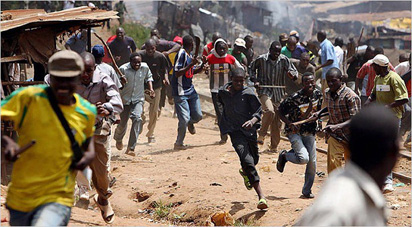Fresh round of protests broke out in Suleja, the commercial nerve centre of Niger State, which is only a few kilometres away to the Federal Capital Territory, Abuja.
The previous day, people protested in Minna, capital of the state, over increasing hardship faced by the people across the country.
The angry Nigerians stormed the streets on Wednesday, calling on the President Bola Tinubu-led government to end the hardship and unbearable inflation they were suffering.
“There is protest ongoing at the Suleja local government area of Niger State. They are calling on Tinubu to end the hardship the masses are suffering on the daily basis in the country,” a witness said.
On Monday hundreds of men, women and youths in Minna, the Niger State capital also staged a protest against the rising inflation in the country.
They had also lamented the hikes in the prices of gas and fuel in the country.
Videos showed that the protesters blocked major roads as they lamented that there was no government effort to arrest the situation of the rising cost of food items.
The protesters had been heard chanting protest songs, while security agents including policemen looked on.
However, Yakubu Garba, Deputy Governor of Niger State, had said the government was aware of the pain and hardship facing families in the country.
Yakubu had told the protesters that the government was working towards reducing the cost of living and the economic implications of the petrol subsidy removal.
Meanwhile, some market women in Ogun State have called for President Tinubu’s resignation over the soaring prices of goods and the biting hardship in the country.
The market women who berated Tinubu’s administration, threatened to beat up the President one-on-one.
The market women disclosed this while speaking to a news reporter in a video on Wednesday. They noted that Tinubu had disappointed Nigerians, particularly the Yoruba.
An elderly woman said “He has disappointed us in Yoruba land, he is not behaving like a Yoruba man.”
Another one asserted that “Everything is so costly to the extent that we cannot afford to buy one bowl of garri. We are tired of everything, when I started business, a carton of fish was 200 naira but now it is 20,000 naira.
“We don’t have food to eat, old people are dying. Business is not moving, and there’s nothing. We are all hungry.
“This problem is too much. If you can’t solve our problem, don’t add to it.”
Another trader appealed to the president to have mercy on Nigerians, saying, “We’re tired of Nigeria; everything is costly, everything is getting costly every day.”
“What he promised us is not what’s happening now. This is too much.”
“At this point we are tired, things are too costly. A carton of Titus is N100,000; it used to cost N17,000. Kote is going to N60,000. Shawa, which we used to sell for N70, now goes for N700.”
When asked what they would tell the president if they had the opportunity to see him, one of the traders said “We will beat the President if we have opportunity of seeing him, we will beat him. What he told us is not what he is doing.”
In Kogi State on Wednesday, there was massive protest over high cost of essential commodities across the state.
Market women and men who protested in the streets of Lokoja, the state capital, lamented the soaring prices of food items which have affected patronage.
Investigation at the market showed that most traders have closed shop as buyers no longer patronize them due to the exorbitant cost of commodities.
A trader, simply identified as Mrs Ladi, who deals in rice and beans, said the sharp increase in the cost of the commodities had affected her business capital as sales was low.
She stated that she could hardly make profit after trading.
“Mudu of rice which was selling for N800 now cost N1,700. This is because a bag of rice which cost N35,000 has now increased to N65,000. With this, we cannot make our own profit.
“This is the reason we are calling on the government to come to our aid by subsidising commodities grown in Nigeria. We are tired of low sales,” she said.
Another trader lamented that despite efforts by traders to part with some profits on goods, poor patronage had become discouraging.
“There is nothing to show for our efforts in terms of expected gains or profit. We are only praying that our labour should not be in vain at the close of trading activities,” she said.
Mrs Laruba, who sells palm oil, lamented that she usually travel to Kogi East to purchase the commodity. But she expressed regrets that the business is no longer profitable.
She added that by the time she calculated her expenses and subtracted the same from the cost of the items, buyers often felt cheated.
Mrs Adah, a vegetable trader, urged the Federal Government to address the astronomical increase in the cost of food items.
She said, ,”Prices of pepper, rice, beans among others have all gone up and the hike in price cut across every item. To worsen the situation, the government is not helping matters.
“We are pleading with the government to assist us with a view to ensuring the reduction in the price of food items. We are only managing to eat. The hike in price of commodities has almost eroded our profit.”


















